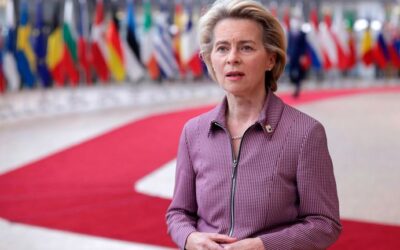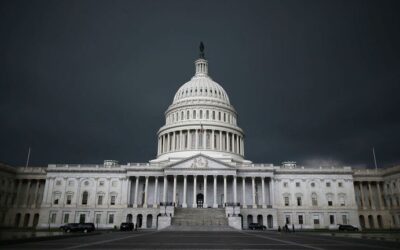Anyone who struggles to connect the events in financial markets to the lives of ordinary people should take a look at today’s goings-on in the bond market.
It was big news when, back in July, the European Union’s leaders agreed to set up a €750bn (£684bn) recovery fund, known as Next Generation EU (NGEU), to help the bloc dig its way out of the economic crisis caused by COVID-19.
The agreement was the first time that the EU’s member states had agreed to a principle of massive collective borrowing – something that eluded them even during the financial crisis and the Eurozone sovereign debt crisis that followed.
The package has the potential to transform the lives of millions of Europeans.
The big question is how investors will respond and whether they will be prepared to lend to the EU in sufficient quantities.
Advertisement
Today, the markets got a good idea, with the EU launching the first auction of bonds under its Support to Mitigate Unemployment Risks in an Emergency (SURE) programme. This is a scheme separate from NGEU and is seeking to raise up to €100bn (£91bn) that can be used by 16 EU member states – led by Italy, Spain, Poland and Portugal – to keep people in their jobs during the crisis.
As this was a first, demand for the bonds was being watched closely, with the EU looking in the first auction to raise €17bn (£15.5bn) from the sale of 10 and 20-year bonds.
More from Business
The outcome was stunning. Orders totalling €233m (£212m) were received, with the 10-year bonds attracting orders of €145bn (£132bn), a record for a single issue in the Eurozone sovereign debt market. Analysts had speculated that demand for the bonds might top €100bn (£91bn) but few had expected it to reach the eventual level seen.
As Matthew Cairns, a strategist at Rabobank, told Reuters: “That is absolutely spectacular. It shows the market and it shows the EU that there is going to be demand for these bonds.”
Antoine Bouvet, senior rates strategist at ING, added: “This is sending a strong signal that they can upsize their issuance without much difficulties.”
That is good news for the EU when it is seeking to raise €30bn (£27bn) from sales of this instrument before the end of the year and, more especially, because the SURE scheme is widely seen as a trial run for the much bigger NGEU – bond issuance for which is due to launch next year.
The two schemes are set to make the EU one of the smallest issuers of sovereign debt to one of the largest as the bloc seeks to raise its borrowings to as much as 15 times the present level.
The pricing of the issue has yet to be confirmed but Reuters said the 10-year bond would carry a negative yield, in other words, investors will be paying the EU for the right to lend to it. That sounds a good deal for the EU but bear in mind the yield will still be higher than that on the equivalent duration of sovereign debt issued by Germany – the EU’s most important borrower and certainly one of its most creditworthy.
While today’s issue is good news for the EU, there remain a plethora of questions regarding how the bloc will emerge from the pandemic. Already, as social restrictions are tightened across a number of EU countries, some economists are wondering whether the €750bn (£684bn) the NGEU hopes to make available will be enough to tide the economy over should a full second lockdown be imposed.
There are also, predictably enough, questions over how the money will be spent. This was a question that has already been raised as the EU thrashed out terms of the NGEU, with the so-called ‘frugal four’ – Austria, Denmark, the Netherlands and Sweden – all demanding that money should be disbursed through the scheme via loans and not grants. There is scepticism that Italy and Spain, the biggest single recipients of both the SURE programme and the NGEU, will be able to spend the money sensibly.
Both have poor so-called ‘absorption rates’, in other words, they are not terribly good at spending money paid to them by the European Commission.
In the same vein, a wider question is whether the EU is capable of using the recovery fund not just to help its economy recover from COVID, but also drive growth for the future.
Image: Ursula von der Leyen has said she wants 37% of NGEU spent on meeting the EU’s climate change targets
Ursula von der Leyen, the European Commission president, has already said she wants 37% of NGEU spent on meeting the EU’s climate change targets – something that has been opposed by some major coal mining countries, notably Poland and the Czech Republic, who fear their economies will be harmed by a dash for green energy and away from fossil fuels.
There is a danger that these arguments hold up the launch of NGEU.
Sphia Salim, interest rates strategist at Bank of America, told clients last week that a delay to NGEU should not necessarily have a major market impact but that they should nonetheless be prepared for the risk of markets thinking that the project could be rejected.
She added: “We would emphasise that the frugal four are the key actors to watch. They do not need the NGEU funds and…hence they are not in a hurry to get a deal done.”
So there are still plenty of risks for the EU as it seeks to get these programmes off the ground.
Yet there is also an opportunity for the EU should it get this right. Many EU politicians and Commission mandarins have long dreamt of a time when the euro could match, or even supercede, the mighty US dollar as a global reserve currency.
Creating a big, liquid instrument in NGEU bonds would be a step towards achieving that, even though the size of the market will still be dwarfed by that of US Treasuries, the deepest and most liquid securities market in the world.









